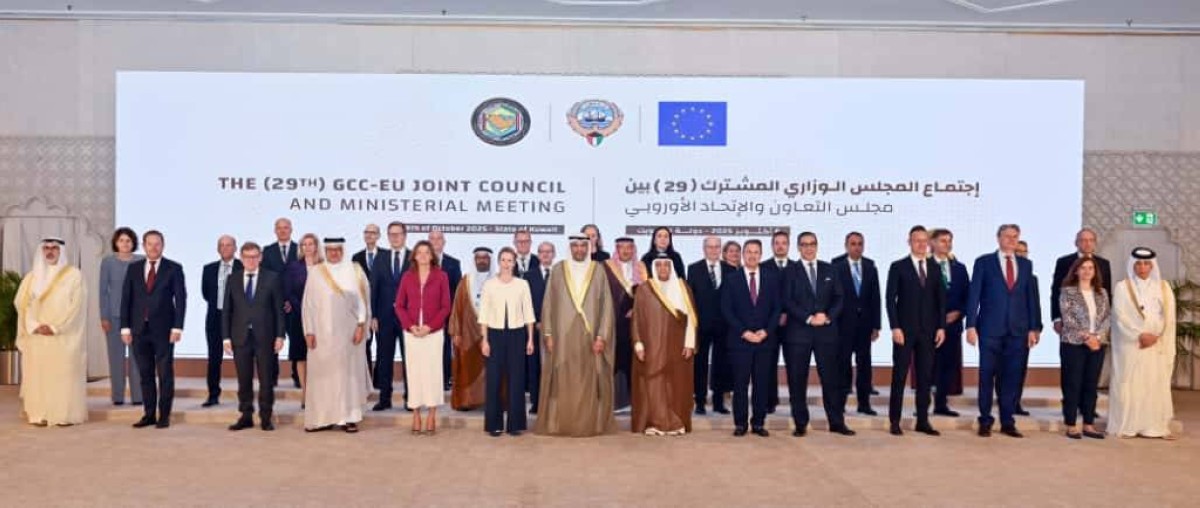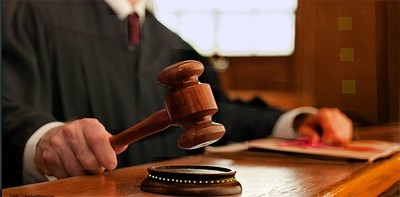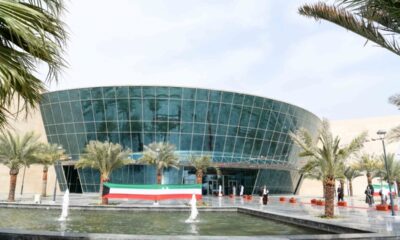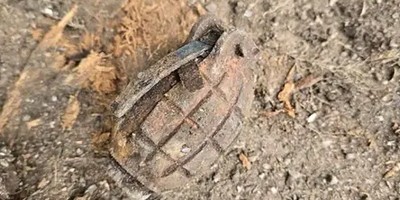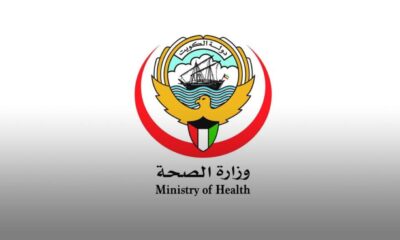KUWAIT: Minister of Foreign Affairs Abdullah Ali Al-Yahya affirmed on Monday that the 29th Joint Ministerial Meeting between the Gulf Cooperation Council (GCC) and the European Union (EU) provided a vital platform to reaffirm shared commitments to strengthen political, security and economic partnerships, promote peace and enhance regional stability. During a press conference, Al-Yahya highlighted that discussions focused on key regional and international issues, underscoring the determination of both sides to enhance coordination in addressing challenges and safeguarding collective security.
“Through hosting these meetings and in its capacity as the current Chair of the Gulf Cooperation Council, Kuwait reaffirms its steadfast commitment to advancing cooperation with our international partners. We seek to build new strategic partnerships that respond to contemporary challenges and open broader horizons for growth, development and stability across our nations,” he said. The Foreign Minister added, “We reiterate our unwavering dedication to joint action to translate the outcomes of these meetings into tangible steps that strengthen cooperation between the GCC and the EU, deepen strategic partnerships and promote our shared interests. Together, we aim to enhance security, stability, and sustainable development throughout our region, paving the way for a future of greater prosperity and peace.”
EU High Representative for Foreign Affairs and Security Policy and Vice-President of the European Commission, Kaja Kallas, stated that the forum focused on reinforcing EU-GCC cooperation and following up on the outcomes of the first EU-GCC Summit. “We also addressed critical regional and global issues – from Gaza and the two-state solution to Ukraine, Syria, Lebanon, Yemen, the Red Sea, Sudan and the Horn of Africa,” she said.
KUWAIT: Ministers attend the 29th Joint Ministerial Meeting between the Gulf Cooperation Council (GCC) and the European Union (EU). – Photos by Yasser Al-Zayyat
Kallas stressed the ongoing instability in the region and expressed solidarity with Qatar, emphasizing the importance of respecting sovereignty and territorial integrity. She highlighted EU’s efforts to pressure Russia toward negotiations for a just peace and commended Gulf states for facilitating prisoner exchanges and supporting the return of deported Ukrainian children.
“The catastrophic situation in Gaza demands urgent attention. Ending human suffering there is our absolute priority. We must build on the political momentum created in New York to achieve a ceasefire, secure the release of hostages, and establish a credible political horizon for peace. The EU stands ready to contribute with all available tools and remains the largest humanitarian donor to Gaza,” she said. Kallas also noted the establishment of a new Palestine Donor Group and the EU’s €1.6 billion commitment to the Palestinian Authority for 2025–2027.
GCC Secretary-General Jasem Al-Budaiwi emphasized the strong and strategic nature of Gulf-European relations, noting that the GCC Secretariat has worked closely with the EU since 1990. He highlighted the 29 ministerial meetings held between the two sides, covering a broad range of cooperation areas, and stressed ongoing high-level political and security dialogues. Al-Budaiwi pointed to upcoming meetings, including the Gulf-European Business Forum in Kuwait in November and the First Gulf-European Energy Forum in Brussels in December, as evidence of continued engagement.
The Second EU-GCC High-Level Forum on Regional Security and Cooperation, held on Sunday, was co-chaired by Foreign Minister Al-Yahya. In his opening remarks, he described the forum as “a high-level platform for dialogue, exchange of views and strengthening communication bridges between the two sides,” expressing hope that its deliberations would yield practical outcomes addressing current challenges and reflecting the aspirations of both peoples.
Al-Yahya underlined that security and peace are pillars of sustainable development, noting that GCC-EU cooperation covers counterterrorism, maritime security, energy supply security, protection of trade routes, and the fight against piracy and arms smuggling. He also highlighted cybersecurity as a pressing area for joint efforts, with both sides sharing expertise and developing rapid response mechanisms to safeguard digital infrastructure.
On regional issues, Al-Yahya condemned Zionist actions exceeding legal and humanitarian considerations, denounced recent aggression against Qatar, and reaffirmed Kuwait’s firm stance on the Palestinian cause, calling for urgent lifting of restrictions on humanitarian aid to Gaza. He welcomed US President Donald Trump’s Gaza peace plan as a step toward restoring stability in the Middle East. Regarding GCC-Iraq relations, Al-Yahya urged Baghdad to resolve outstanding issues with Kuwait in line with international law, including repatriation of prisoners, return of property and archives, maritime border demarcation, and implementation of the Khor Abdullah navigation agreement.
Al-Budaiwi reiterated that the EU is a strategic partner in promoting international peace and security, emphasizing joint efforts to address regional tensions and ensure safe energy and maritime navigation. He welcomed President Trump’s Gaza initiative as a realistic opportunity to end violence, restore stability and facilitate humanitarian aid, while stressing the urgency of halting Zionist attacks and addressing Iran’s nuclear program through dialogue.
Kallas concluded by stressing the importance of diplomacy, urging the GCC and EU to address challenges collaboratively. She noted that forum discussions prioritized Gaza, maritime security in the Red Sea and Iran’s nuclear program, with the EU reaffirming sanctions while maintaining its commitment to the diplomatic track. She also highlighted EU maritime operations in the Red Sea and Gulf of Aden, which have protected over 560 commercial vessels and supported 600 others, with the mission extended through February 2026. The discussions concluded with a joint statement reflecting “a spirit of understanding and constructive cooperation” between the GCC and EU.



